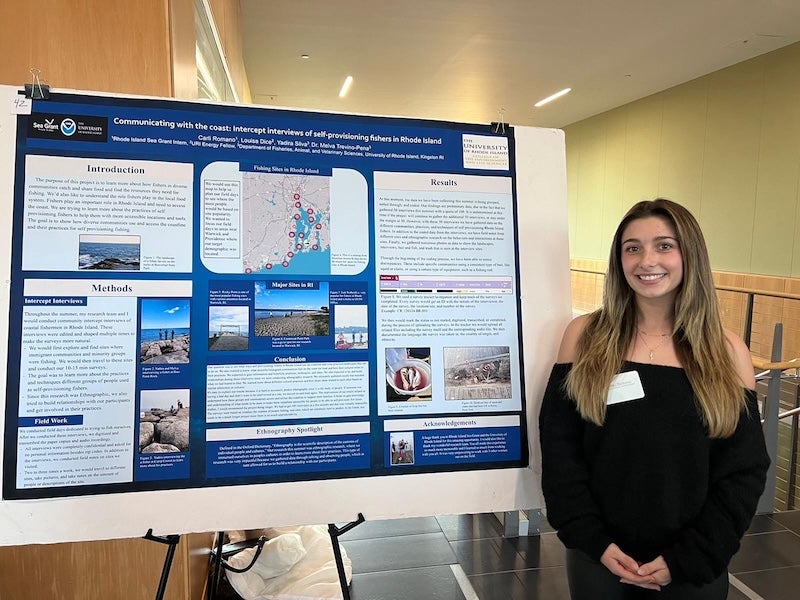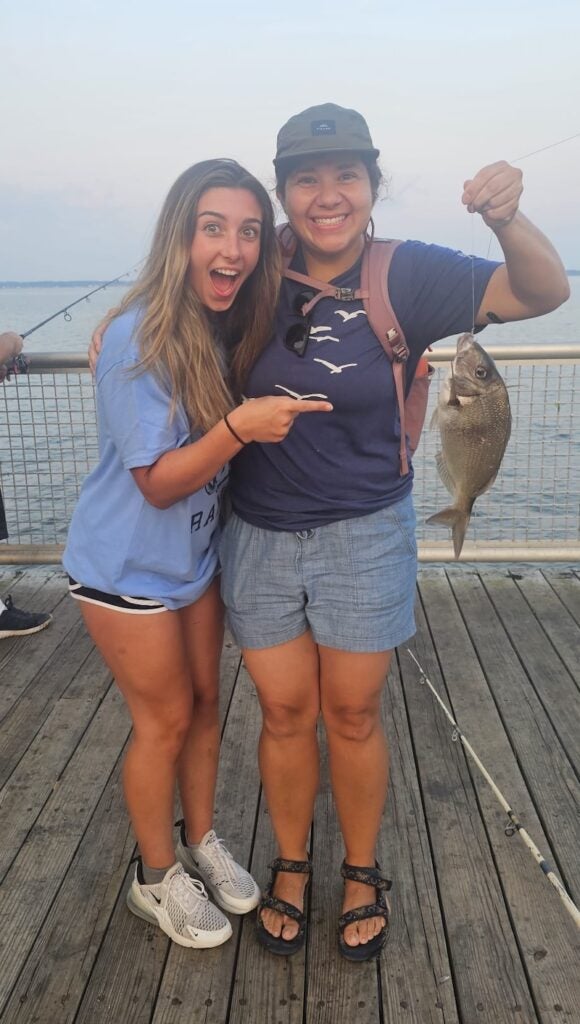This summer, CELS is highlighting the work of students who were awarded fellowships through the CELS Summer Research Fellowship Program. Marine affairs and political science double major Carli Romano, from Westborough, Massachusetts, is working with coastal access policy research in Rhode Island alongside Melva Treviño Peña, assistant professor of sustainable agriculture and food systems, and Jesse Reiblich, assistant professor of marine affairs.
The Rhode Island shoreline access bill was signed into law in June 2023, redefining the demarcation of the state’s shoreline from the mean tide line to 10 feet landward from the visible high tide line. This legislation aims to clarify where the shoreline is and strengthen public access to coastal right of ways. “The new law provides a clearer understanding of lateral and longitudinal access by defining public access from 10ft from the high tide line,” Romano notes. “But what we are doing is researching how the public is actually able to access this 10 feet and see how the communities are understanding this new law and what needs to be changed if they aren’t.”
Romano’s work this summer focuses on assessing whether this redefinition of Rhode Island’s shoreline is sufficient in effectively providing public access to the shore, and how climate change impacts this new definition. “We are trying to figure out what access means for the public and how access pairs with ability,” Romano says. “It has been seen that the public has been having a hard time accessing the coast because of lack of ability to access. A lot of public access ways need to be maintained and a lot of private home owners try to restrict access ways, which causes a lot of friction from both sides.”
Romano expressed her excitement about working with Treviño Peña and Reiblich in understanding the impacts of this policy on coastal communities in the state. “One of the things I love most about this project is the balance between legislative research and direct community engagement,” she says. “Some days are spent diving into legal documents and policy history, while others involve organizing and participating in focus groups with coastal community members to understand how the new law is affecting their daily lives.”

The project is fitting for Romano as she worked with Treviño Peña in her internship last year. She notes, “I worked with Dr. Treviño Peña during my Sea Grant internship last summer on a project that explored how different communities catch, share, and access resources for fishing—a truly meaningful experience.” She initially connected with Reiblich as a student in one of his classes, and he is now her academic advisor. She adds, “My internship last year was instrumental in helping me build connections with Dr. Treviño Peña and Dr. Reiblich, which ultimately opened the door to this research fellowship.”
In addition to her internship, Romano notes that taking the courses MAF 220: Intro to Marine and Coastal Law and MAF 310: Communication for Marine Affairs were also influential in her understanding of marine law and science communication. “These courses helped me understand the foundational principles of coastal and marine law,” she says, “and taught me how to communicate scientific research to diverse audiences—especially important when engaging with the public.”
“As someone extremely passionate about marine policy, this has been an incredible learning experience,” Romano adds. “I’m gaining hands-on experience in analyzing legislation and understanding how laws are evaluated for effectiveness. This research ties directly into my marine affairs studies and allows me to engage with the Rhode Island communities I care about.”
Romano enjoys working with the research team and traveling across the state to talk with coastal communities to learn how they are being impacted by the state’s public shoreline access laws. The fellowship has provided her with an opportunity to actively participate in understanding how policy influences people’s daily lives. “It has been fulfilling to educate community members on their rights and hear their feedback,” she says. “Seeing firsthand how public policy translates into real-world impacts is both inspiring and eye-opening.”

Treviño Peña echos Romano’s enthusiasm for the collaboration on this project. “She’s smart, driven and a hard worker,” she says of Romano. “It’s really exciting to meet a student like Carli who is so passionate about these issues and research questions so early on in her academic career. She’s a great addition to our team and has even taken on leadership roles supporting other students, building on the experience and skills she developed last summer as my Sea Grant intern on a coastal fishing access project.”
For students who are also interested in pursuing a research fellowship, Romano encourages them to dive into research about the things that they are passionate about and apply to opportunities of interest. “Research is such an amazing opportunity, so go for it,” she says. “Submit that application, even if you think you might not be selected. You never know, and there’s always meaningful work to be done. There’s space for your voice and your ideas in academic and community-driven work.”
Written by Yvonne Wingard, CELS Communications Fellow

